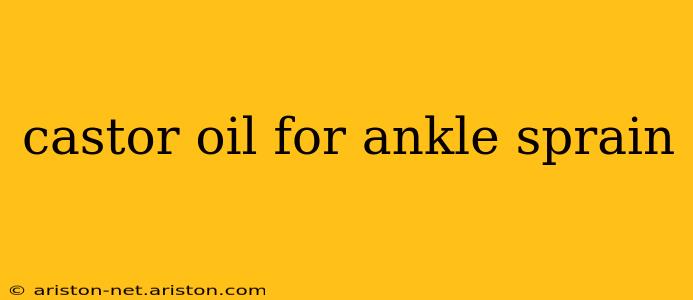Ankle sprains are a common injury, often caused by a sudden twisting or rolling of the ankle. While conventional treatments like RICE (Rest, Ice, Compression, Elevation) and physical therapy are widely recommended, some individuals explore alternative remedies like castor oil. This article explores the potential benefits and limitations of using castor oil for ankle sprains, addressing common questions and concerns.
Does Castor Oil Help with Ankle Sprains?
The effectiveness of castor oil for ankle sprains is not supported by robust scientific evidence. While castor oil possesses anti-inflammatory properties due to its ricinoleic acid content, its topical application for sprains hasn't been extensively studied in clinical trials. Its main mechanism of action is to potentially reduce inflammation and promote blood circulation. However, more research is needed to definitively confirm its efficacy in treating ankle sprains.
How to Use Castor Oil for Ankle Sprain (If Choosing to Try It)?
If you choose to try castor oil, proceed with caution and consult a healthcare professional first. Here's a potential method of application:
- Clean the area: Thoroughly clean and dry the affected ankle before applying the oil.
- Apply the oil: Gently massage a small amount of pure castor oil onto the sprained ankle. Avoid applying excessive pressure, especially if there is significant pain or swelling.
- Cover the area: You may optionally cover the ankle with a clean cloth or bandage to retain the oil and prevent staining clothes.
- Repeat as needed: You can repeat this process several times a day, but always monitor for any adverse reactions.
Important Note: Castor oil is not a replacement for conventional medical treatment. It should be used as a complementary therapy, not a primary treatment.
What are the Benefits of Castor Oil?
Castor oil's potential benefits stem from its ricinoleic acid content, a fatty acid with purported anti-inflammatory and analgesic (pain-relieving) properties. While these effects are observed in some studies, the application to ankle sprains needs further investigation. These benefits are generally associated with its internal use or application to other conditions.
Is Castor Oil Good for Reducing Swelling?
Castor oil may contribute to reduced swelling due to its potential to improve blood circulation. However, relying solely on castor oil for swelling reduction in an ankle sprain is not recommended. Elevation and compression remain crucial elements of conventional treatment for managing swelling effectively.
Can Castor Oil Help with Ankle Pain?
Ricinoleic acid's analgesic properties might offer some pain relief, but its effectiveness in treating ankle sprain pain hasn't been clinically proven. Pain management should be addressed with appropriate medical advice. Over-the-counter pain relievers or prescription medications may be more effective.
What are the Side Effects of Castor Oil?
While generally considered safe for topical use, castor oil can cause skin irritation or allergic reactions in some individuals. A small patch test before widespread application is recommended. Furthermore, ingestion of castor oil can lead to gastrointestinal upset.
When to See a Doctor for an Ankle Sprain?
Seek immediate medical attention if you experience:
- Severe pain
- Inability to bear weight on your ankle
- Significant swelling
- Deformity of the ankle
- Numbness or tingling in your foot or toes
This information is for educational purposes only and should not be considered medical advice. Always consult a healthcare professional before starting any new treatment, especially for injuries like ankle sprains. They can accurately diagnose the severity of your injury and recommend the most appropriate treatment plan. Self-treating can potentially delay proper healing and worsen the condition.
